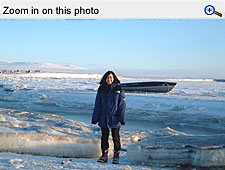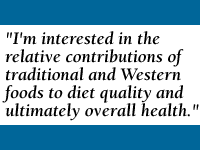Reindeer meat is a healthy food
By Andrea Bersamin, CANHR, and Amy Simpson, CES

UAF-UC Davis graduate student Andrea Bersamin on the shore of the Bering Sea in December
2003. Bersamin is one of many CANHR researchers investigating the impact of current
dietary patterns practiced by Yup'ik Eskimos. Photo courtesy Andrea Bersamin.
The "extreme" dietary habits of Alaska Natives have captured the imagination of the world for hundreds of years. Relative isolation has helped maintain traditional dietary patterns to some extent, but rapid change over the last two centuries has brought a drastic increase in consumption of Western foods. This change could pose long-term health consequences for Alaska Natives.
The Institute of Arctic Biology's Center for Alaska Native Health was established at UAF in 2001 to address increasing health disparities between Alaska Natives and the non-Native U.S. population. Since 2003, researchers have collected data about diet and physical activity data from the residents of seven rural Alaska Native communities in the Yukon-Kuskokwim Delta. UAF Cooperative Extension Service Foods and Nutrition Specialist Bret Luick, the principal investigator for the nutrition component of the study, graduate student Andrea Bersamin and other CANHR researchers hope to identify dietary patterns associated with risk for chronic disease, including diabetes, obesity and cardiovascular disease.
"Food was a major part of my upbringing," Bersamin said. "I grew up in Mexico City eating traditional Mexican food but also traveled throughout Asia when I was young and learned to like those flavors just as well. While attending the University of California, Berkeley, I became fascinated by the complex meanings of food in different cultures."
 Bersamin is currently a graduate student at the University of California, Davis where
she is studying nutritional biochemistry and epidemiology. "I have a joint appointment
between the University of Alaska Fairbanks and UC Davis," Bersamin said. Sheri Zidenberg-Cherr
and Judith Stern are her mentors at UC Davis, and Bret Luick is her mentor at UAF.
Bersamin is currently a graduate student at the University of California, Davis where
she is studying nutritional biochemistry and epidemiology. "I have a joint appointment
between the University of Alaska Fairbanks and UC Davis," Bersamin said. Sheri Zidenberg-Cherr
and Judith Stern are her mentors at UC Davis, and Bret Luick is her mentor at UAF.
Traditional Native foods, including fish, marine mammals, game such as reindeer, berries and wild greens are excellent sources of many nutrients. Nevertheless, the researchers found that store-bought foods compose the majority of the Yup'ik diet, particularly among youth, and many of the store-bought foods are of low nutritional quality. The CANHR researchers hope to find ways to encourage the villagers to eat more of their traditional foods and complement or supplement their diet with healthy store-bought food choices. Reindeer herding programs play an important role in sustaining the local food system, not only because the meat itself offers a nutrient-rich food source, but herding promotes an active lifestyle, which is also critical to maintaining long-term health.
"My dissertation will focus on the impact of current dietary patterns practiced by Yup'ik Eskimos at risk for chronic disease. In particular, I'm interested in the relative contributions of traditional and Western foods to diet quality and ultimately overall health in this population." Bersamin hopes to continue this work when she graduates.


